The
Byrds
Albums
reviewed on this page: Mr. Tambourine Man,
Turn! Turn!
Turn!, Fifth Dimension,
Younger than Yesterday,
The Notorious Byrd
Brothers, Dr. Byrds &
Mr. Hyde, Untitled, Byrdmaniax, Farther Along
Byrds outline:
founded folk-rock along with others such as The Beau Brummels, and became
the blueprint for numerous bands from Love, to Jefferson Airplane to The Cryan Shames. Gradually drifted into psychedelia, shed
members, and the went into straight country-rock with Sweetheart of the Rodeo. Their final albums (with a substantially different lineup than Sweetheart),
continued the country-rock pattern, but were more folky, loose and bad.
Also - one of the top American bands of the era.
Initial
Personnel: Jim (later Roger) McGuinn (12-string guitar), David
Crosby (guitar), Gene Clark
(guitar), Chris Hillman (bass), and Mike Clarke (drums). Clark quit after Turn! Turn! Turn!, Crosby out after Younger than Yesterday. Retooled for Sweetheart of the Rodeo, with Kevin Kelley on drums and Gram Parsons
on guitar. Afterwards, Hillman and Parsons left for the Flying
Burrito Brothers, and Kelley was fired. New lineup for Dr. Byrds:
McGuinn, Gene Parsons (drums), Clarence White (guitar), and John York (bass). Skip Battin replaced York for the final two albums.
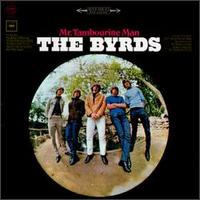 Mr.
Tambourine Man (Jun.
1965), ****1/2
Mr.
Tambourine Man (Jun.
1965), ****1/2
America's
response to the Beatles, and the birth of folk-rock. The
Byrds
combined American folk music, 12-string guitars, Beatlesque harmonies
and Dylan lyrics into the smash hit title track, and the rest of the
album generally sticks with that formula (with the exception of the
lyrics). Their debt to the Beatles is enormous, right down to
the open strum endings on some songs. However, their pace is
slower, and sound less harsh - relying more on acoustic guitars and
an electric 12-string. But while the Beatles were the best
and
most well-known group to come out of the Mersey beat explosion, this
album almost single-handedly established folk-rock, and influenced
everybody from Jefferson
Airplane to REM. Heck, they could write their own
songs,
relying on Gene Clark for gems like "I'll Feel A Whole Lot
Better" and gentle country-influenced "I Knew I'd Want
You". Lots of fun,
historically significant and well done.
Produced by Terry Melcher.
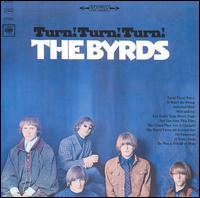 Turn!
Turn! Turn! (Dec. 1965),
***1/2
Turn!
Turn! Turn! (Dec. 1965),
***1/2
Six
months after their debut, The Byrds tuned their approach with Turn!
Turn Turn!
- less McGuinn 12-string solos, plenty of chiming guitars, perfected
harmonies, and more original material. The title track is the one
that most resembles their debut with its strong McGuinn lead,
Biblical lyrics and has since become a song that connotates the era.
Still, this album as recorded in the six months following Mr.
Tambourine Man,
and it has weak spots - an irrelevent cover of "Oh Susannah!",
one good Dylan cover "Lay Down Your Weary Tune", an ok one
"The Times They Are A'Changing" and some other covers. But
who needs Dylan when you have Clark, whose "If You're Gone",
the country-minded "Set You Free This Time", or the folk of
"The World Turns All Around Her" are perfect blends of
electric rock and tradition. The album has sentiments of
expectations - "The Times They A'Changing" and McGuinn's
working of "He Was a Friend of Mine," but the band was not
political or particularly contemporary in subject. A solidifying
album more than an advancement, but solid. Clark's swansong.
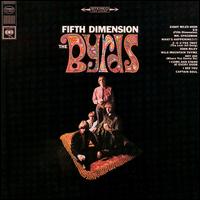 Fifth
Dimension
(Aug. 1966), ****
Fifth
Dimension
(Aug. 1966), ****
A
fantastic leap upwards... and another padded release. The Byrds fell
straight into early psychedelia here, led by McGuinn's fascination
with jazz and non-Western music, which led to fascinating, fractured
guitar solos. The band was hit was Clark's departure, with McGuinn
picking up most of the slack. The whole album has a nascent feeling
of drug use and the now-rote flight metaphor ("Fifth Dimension",
"5D", "Mr. Spaceman" "2-4-2 Fox Trot (The
Lear Jet Song)"), and Crosby's fine "What's Happening?!?!"
sums up the band's state of mind. From a historical standpoint you
can hear the blueprints of several strands of music trends on Fifth
Dimension: psychedelic freakouts in McGuinn's twisted guitar solos,
the technical jazz of early Yes ("I See You"), the
traditional-minded work of Fairport Convention ("John Riley"),
protest rock ("I Come and Stand at Every Door"). While
their drug-aided writing was cutting-edge, it was not plentiful, and
Fifth
Dimension has
more traditional stopgaps ("Wild Mountain Thyme", "John
Riley", the antiwar "I Come and Stand at Every Door")
and the album's latter half is a puzzling collection of filler: a
brisk "Hey Joe", an R&B(!) instrumental, and a failed
sound experiment ("2-4-2 Fox Trot (The Lear Jet Song)" -
takeoff noises with rudimentary backing). Allen Stanton's production
retains the focus on McGuinn's 12-string, but adds orchestration on
the traditional numbers, and otherwise is unremarkable. The Byrds
would never be this far ahead of the curve again.
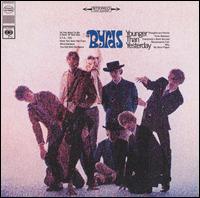 Younger
Than Yesterday
(Mar. 1967), ***1/2
Younger
Than Yesterday
(Mar. 1967), ***1/2
"So
you want to be a rock 'n' roll star?" the Byrds asked. A valid
question, as many emulated them, and also because the Byrds started
to pass the baton at this point; Younger Than Yesterday was
another follow-up album, with few new highlights. In fact, maybe the
Byrds wished to maintain their top status by abandoning trademarks:
Fifth
Dimension's
gnarled 12-string solos, and the layered harmonies. When combined
with Gary Usher's sometimes-psychedelic pop production (mostly
backwards guitars), the Byrds started to lose what made them special,
even if their work was strong. This marks the point when McGuinn's
sci-fi and experimental tendencies started to hobble him. He
probably conceived "CTA 102" in a mental haze, with
rambling science lyrics and an early nonsense synthesizer jam for a
solo. Fortuitously, Crosby and Hillman compensate. Hillman supplied
several Beatles-go-country songs - "Have You Seen Her Face,"
"Thoughts and Words" and the country-rock "Time
Between" are good flickering guitar songs. Crosby's serious
songs appear in sharp relief against the lighter material - weary
electric folk ("Everybody's Been Burned", a CS&N
precursor) and an angry parable recited in a rising tide of reversed
guitars ("Mind Gardens"). Yet, the old ways were still
effective: a cover of Dylan's "My Back Pages" is one of
their strongest Dylan covers, and a throwback in terms of style and
production. The album closes with the great "Why" which
could easily have fit on Fifth
Dimension -
a basic rising chord progression, the harmonies, but with a steady
rhythm that serves as a dancing background for a cracked McGuinn
12-string solo. The Byrds were at the start of a slow decline, but
it wasn't apparent yet, and Younger Than Yesterday is
a solid album.
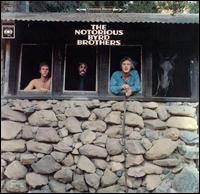 The
Notorious Byrd Brothers
(Jan. 1968), **
The
Notorious Byrd Brothers
(Jan. 1968), **
Only
McGuinn, Hillman
and Clarke, the band fell. Down. Hard. Gary Usher continued to
make them sound like a lame pop group, while the band got high as
kites. McGuinn was still way out there
("Artifical
Energy", "Dolphins Smile", "Space Odyssey"
the latter presented as a traditional folk ballad) and his vocals are
mediocre (and he's the best of the lot). Everyone collaborated, and
Hillman shows none of his sharp talent from YTY in
the present setting. Okay, the band is
still concerned with
war ("Draft Morning"), but Notorious's songwriting is
shockingly weak. Warning sign: one of the better tracks is a
Goffin/King composition ("Wasn't Born to Follow"), and
"Tribal Gatherings" is offbeat, shifting between jazzy to
rock, and has some good guitar work. Otherwise, nothing new - a bit
more country ("Get to You","Old John Robertson"),
the droning "Change is Now") and a lot of blandness. Usher
doesn't spark anything either, employing some of the usual tricks -
phasing ("Natural Harmony", "Old John Robertson")
and backwards guitar ("Wasn't Born to Follow"), and the
band's harmonies are hurt by the loss of band members. If you want
tripped out, middling music, you may enjoy this; otherwise, forget it.
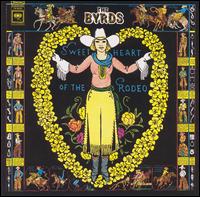 Sweetheart
of the Rodeo
(Aug. 1968), ****
Sweetheart
of the Rodeo
(Aug. 1968), ****
According
to the liner notes, McGuinn wanted to make "a double LP covering the
whole of American musical history, from traditional folk and classic
country to rock & roll and the new dawn of the Moog
synthesizer,"
an album I have no doubt would have been a fiasco and highly enjoyable
to review. Instead, new member Gram Parsons convinced the
band to
record a country album. Mostly recorded in Nashville with
sidemen, the Byrds were the first major band to venture deep into
country, and the results were excellent. The band sparingly
used electric instuments in favor of steel
guitar as the lead, fiddle and banjo, giving them a vastly revised
sound. The material is mostly excellent - a pair of
new
Dylan songs ("You Ain't Goin' Nowhere" and "Nothing Was Delivered" with
McGuinn adopting Dylan mannerisms in his singing), and a pile
of standards. Parsons was supposed to have a greater
role on
the album, but interlabel disputes forced the band to
scrap most
of his steady lead vocals in favor of McGuinn. Still, Parsons
was
a sharp songwriter and his two contributions: "Hickory Wind" and "One
Hundred Years from Now" handily trump the band's other contribution:
McGuinn and Hillman's "I am a Pilgrim". Of course, as
newcomers
to country, the Byrds got to cover anything they wanted, and
their
session backers made everything sound professional. For the
moment, the band's As exciting as this direction was, the album did not
sell, Parsons left the band to start the Flying Burrito Brothers,
Hillman followed and Kevin Kelley was fired.
Most
re-releases contain versions of "The Christian Life", "You Don't Miss
Your Water" and "One Hundred Years from Now" with Parsons' superior
vocals, along with some fine other rejected songs ("All I Have Are
Memories" and "Lazy Days").
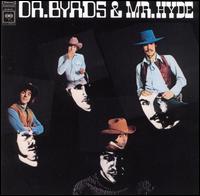 Dr.
Byrds & Mr. Hyde
(Mar. 1969), ***
Dr.
Byrds & Mr. Hyde
(Mar. 1969), ***
The
Byrds were now McGuinn and three new guys, and they retained
the country-rock missive, but with a more electric rock
approach.
Clarence White's guitar and Dylan producer Bob
Johnston's work provide needed gusto, and McGuinn sounds
invigorated. These Byrds sound like they might do something
thoroughly great, cause enough for celebration.
McGuinn's writing dominates the album (with some
co-writes), and his songs cover typical subjects like old dogs ("Old
Blue"), women ("Candy"), or more Dylanesque material (the fun "Drug
Store Truck Drivin' Man", "King Apathy III"). The rest of the
album is
filled with fine covers (Dylan again with "This Wheel's on Fire",
Paxton "Your Gentle Way of Loving Me"), more outer-space weirdness
("Child of the Universe"). The album's close is its oddest
moment
- a
medley of "My Back Pages" and a pair of blues tunes which sounds like
an excellent C&W bar band version, both reaffiring their past,
and
distancing themselves from it. Regretfully, without Parsons,
McGuinn's tremulous
songwriting talent was the only thing separating the Byrds from an
actual
C&W cover band, and that was thin support.
The
Ballad of the Easy Rider
(Dec. 1969)
I
don't have this. The title track was their last Top Ten hit
in the US.
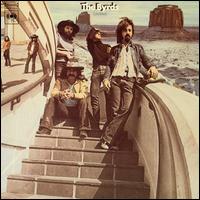 Untitled (Oct. 1970),
**1/2
Untitled (Oct. 1970),
**1/2
A
double album, half live. They
sound good live, although they mainly play earlier song
like "Mr.
Tambourine Man" and an entire side is devoted to "Eight
Miles High". Oddly enough, it largely ignores their
newer
country-rock material, save for "Nashville West" and
the excellent "Lover of the Bayou", but the lineup
gives
everything a rockin' country tint.
The
studio side is more country-rock, but lighter than Dr. Byrds & Mr. Hyde.
McGuinn had worked with theatre
director
Jacques Levy on another bizarre, ambitious idea: a
psychedelic/country-rock musical based on Ibsen's Peer Gynt, called Gene Tryp.
It never came to pass, but it provided a few good nuggets for
the Byrds later work, as Levy's oblique lyrics are an adequate Dylan
substitute. One of these is the live side's strongest song
(the
opener "Lover of the Bayou") and the two others comprise the studio
highlights. "Chestnut Mare" has odd spoken versus, with
McGuinn
talking about pursuing the mare in increasingly unrealistic terms,
while "Just a Season" is a return to the folky harmony days of the
band, and "All Things" is more excellent country-rock. Aside
from
that, Untitled shows
a series of misjudgments. McGuinn
was not the greatest singer, but he
was the Byrds' predominant voice. The newer members' voices
range from stifled (Clarence White on "Truck Stop Girl") to bland (Skip
Battin on "Take a Whiff" or Gene Parsons on "Yesterday's Train").
Further, bassist Skip Battin wrote or co-wrote most
of the
remainder. Battin's eco-friendly material is just as
annoying and dated as
McGuinn's earlier space-eyed garble ("Hungry Planet") and his
country-rock songs are mediocre ("You All Look Alike" or "Well
Come Back Home" which sounds like a San Francisco song with its loose
feel and tripping ending). The band's playing is not an issue
-
White's guitar sparkles throughout and they were clearly
talented.
Yet, with unfamiliar vocals and unmemorable material, Untitled often
sounds like a lesser band. Melcher produced again.
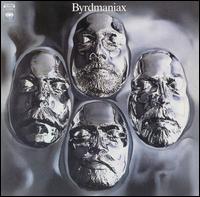 Byrdmaniax
(Jul. 1971), *1/2
Byrdmaniax
(Jul. 1971), *1/2
A
fiasco. Byrdmaniax
is folkier than Untitled,
and Melcher's
production mars the already tepid material to the point that it
ended his career. McGuinn had been interested in Americana,
and
Byrdmaniax has it in spades: goofy Dixieland ("Citizen Kane", "I Wanna
Grow Up To Be a Politican"), 50s rock ("Tunnel of Love"), soul backing
vocals ("Glory Glory", "Kathleen's Song"). Untitled's bad
decisions are repeated (middling non McGuinn vocals, crumbly
production), and Melcher also obliterated White's solos or preempted
them with session guy Larry Knechtel's overabundent keyboard work.
McGuinn's material is the strongest, and at best it is
tolerable
background music ("Glory Glory", "Absolute Happiness" or "I Wanna Be a
Politician"). The Battin/Fowley team wrote must of the
clunkers,
including the annoying "Tunnel of Love", and the album closes with
soft-rocker Jackson Browne's "Jamaica Say You Will". The
band
was retreating somewhere (Airplane rootsy? soft-rock?), but
it
was not a dignified march. Avoid.
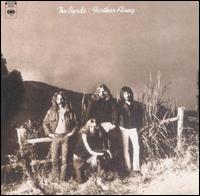 Farther
Along (Dec. 1971), **
Farther
Along (Dec. 1971), **
Farther
Along
terminates the Byrds deep in roots music, along with a few
nods to 50s rock and roll. Melcher was
out, and the band's self-production is straightforward. The
songwriting, however, is as flaccid as ever. Songs about
roadies,
songs about country life, songs about women, well made, but
for
educational or historical purposes only. McGuinn's sole song,
"Tiffany Queen" is a decent retro-rocker, and White's folk (title
track) and bluegrass instrumental ("Bristol Steam Convention Blues")
are fine, but the remainder are uninspiring. White's snappy
guitar leads are rare, instead adding mandolin, banjo on the folkier
songs. The only songs worthy of condemnation is the
Battin/Fowley
work "America's Great National Pastime" with stupid satirical lyrics
set to a dixieland tune. Fittingly, it was chosen as the
band's
final single and neither it nor the album charted. The Byrds
were the first big folk-rock band, the first major country-rock band,
but everyone from Seatrain to the Kinks was with the program, and doing
it better.
 Mr.
Tambourine Man (Jun.
1965), ****1/2
Mr.
Tambourine Man (Jun.
1965), ****1/2  Turn!
Turn! Turn!
Turn!
Turn! Turn!  Fifth
Dimension
Fifth
Dimension
 The
Notorious Byrd Brothers
The
Notorious Byrd Brothers Sweetheart
of the Rodeo
Sweetheart
of the Rodeo Dr.
Byrds & Mr. Hyde
Dr.
Byrds & Mr. Hyde

